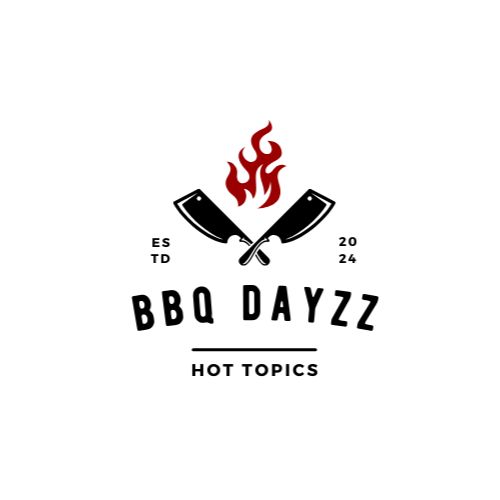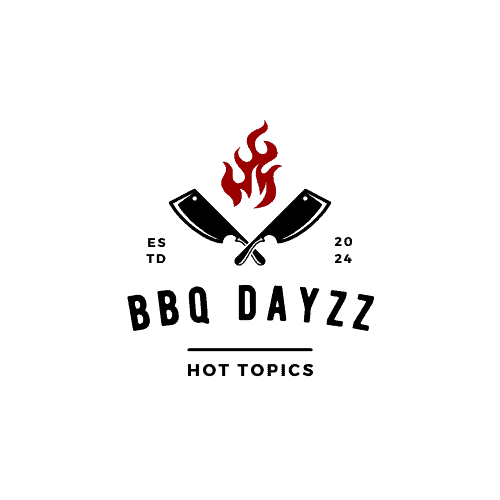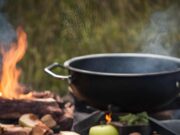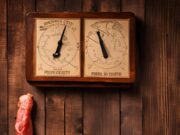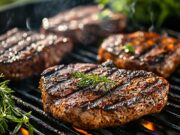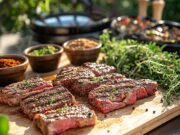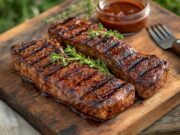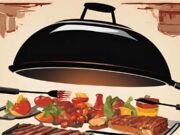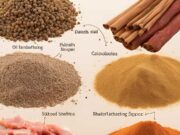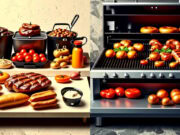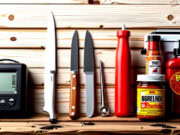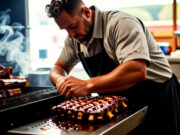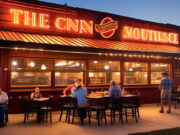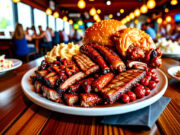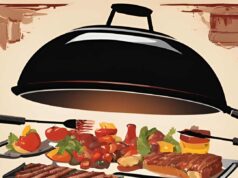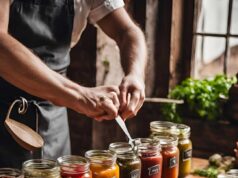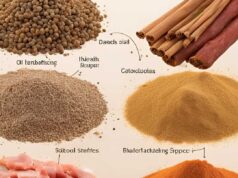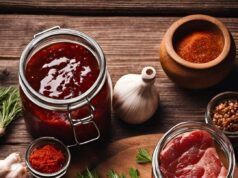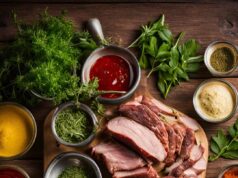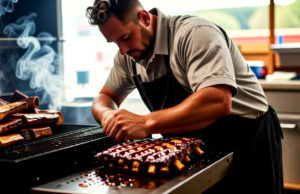- Key Takeaways:
- Importance of Maintaining a Clean BBQ
- Essential Cleaning Tools and Supplies
- Pre-Grill Hygiene: Preparing Your Grill
- Cleaning Your Grill: Step-by-Step Process
- Cleaning BBQ Utensils
- Post-Grilling Maintenance Tips
- Seasonal Deep Cleaning for Your BBQ
- Common Mistakes to Avoid
- Frequently Asked Questions
A clean BBQ is essential for ensuring that your grilling experience remains both enjoyable and safe.
Maintaining proper hygiene prevents foodborne illnesses, enhances the flavor of your meals, and prolongs the lifespan of your grill and utensils.
This article outlines the importance of cleanliness, identifies the essential cleaning tools required, and provides step-by-step methods for maintaining your grill and utensils.
You will find valuable tips to ensure your BBQ is always prepared for the next cookout.
Key Takeaways:
- Regularly cleaning your BBQ is essential for health and safety while grilling.
- Use the proper tools and solutions to effectively clean your grill and utensils.
- Follow a step-by-step cleaning process and avoid common mistakes to maintain a safe and well-functioning BBQ.
Importance of Maintaining a Clean BBQ
Maintaining a clean BBQ is essential for both hygiene and safety, as it significantly reduces the risk of bacterial contamination that can arise from leftover food debris and grease buildup.
Regularly scrubbing the grill grates is not only crucial for keeping harmful pathogens at bay but also enhances the flavors of your favorite dishes, such as juicy steaks and mouthwatering burgers. When the grill is clean, the natural flavors of the meat can truly shine through, creating an unforgettable dining experience.
Neglecting cleanliness can lead to cross-contamination and unpleasant tastes, transforming what should be a delightful meal into a risky endeavor. Therefore, adopting a routine of thorough cleaning and maintenance not only ensures food safety but also elevates your overall grilling experience, allowing you to savor every bite with confidence.
Essential Cleaning Tools and Supplies
To maintain a clean BBQ, it is essential to have the right cleaning tools and supplies. These items will help ensure that your grill and utensils are properly sanitized and free from debris and bacteria.
Pre-Grill Hygiene: Preparing Your Grill
Pre-grill hygiene is essential for maintaining a clean and safe grilling environment. This involves inspecting and preparing your grill to prevent potential hazards associated with grilling, such as bacterial contamination and residue buildup.
To start, take the time to conduct a thorough inspection of the grill, checking for any signs of wear or damage that could affect its performance. Next, concentrate on cleaning the grates; using a wire brush can effectively remove any stuck-on food particles. Additionally, make sure to empty the drip tray and inspect the burner tubes for any obstructions.
It is also crucial to assess the tools and utensils you plan to use. Ensure they are clean and sanitized, as these directly impact the safety of your food. By prioritizing these cleaning and inspection steps, you will create a safer grilling experience.
Cleaning Your Grill: Step-by-Step Process
Cleaning your grill efficiently involves a systematic step-by-step process that ensures every component, from the grates to the firebox, is free from grease, food particles, and hidden bacteria. This approach not only maintains the grill’s performance but also extends its lifespan.
Burning Off Residue
One effective method for cleaning your grill involves burning off residue using high heat. This process not only removes stubborn food particles but also helps eliminate any bacteria that may be present.
To achieve the necessary high temperature, preheat the grill by turning all burners to their maximum setting and allowing it to heat for approximately 15 to 20 minutes. This intense heat is essential, as it ensures that any leftover residue effectively burns away, turning to ash and facilitating easier cleaning afterward.
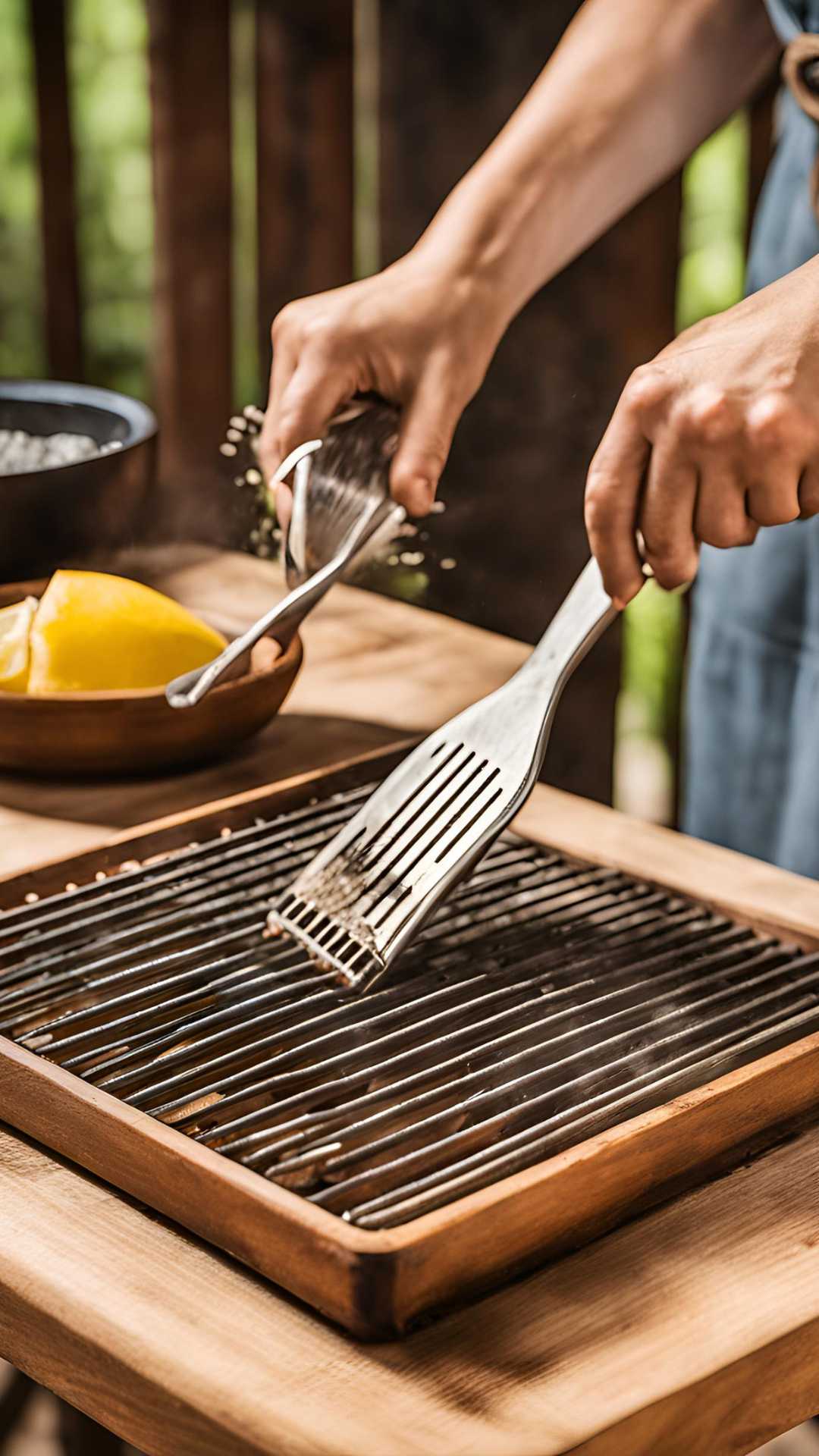
Safety is paramount during this process; always ensure that the grill is placed in a well-ventilated area and keep flammable materials away from it. It is advisable to wear heat-resistant gloves while handling the grill grates or tools, and having a fire extinguisher nearby is a prudent precaution.
After the high-heat session, remember to let the grill cool down before proceeding to brush off the ash, ensuring a thorough cleaning session without compromising your safety.
Soaking Grill Parts
Soaking grill parts in a cleaning solution is an effective way to loosen stubborn grime and residue, making the scrubbing process more efficient and ensuring a thorough clean for components such as grates and burners.
A popular choice for this task is a vinegar solution, which can break down grease and eliminate odors. Baking soda serves as a gentle abrasive that helps tackle tough spots without scratching sensitive surfaces. Depending on the extent of dirt buildup, soaking times can range from 30 minutes to a few hours, ensuring that even the most challenging areas receive adequate treatment. Keeping Your BBQ Clean: Hygiene Tips for Grills and Utensils
This method not only simplifies the scrubbing phase, allowing for easier removal of cooked-on residue, but it also promotes a more sanitary grilling environment. Ultimately, this approach enhances the lifespan of well-maintained grill parts.
Scrubbing Techniques
Utilizing effective scrubbing techniques is essential for removing grime and buildup from your grill. Employing the right tools can make this task easier and more efficient.
By selecting appropriate implements such as bristle-free brushes or non-abrasive sponges, you can ensure that different grill surfaces are cleaned thoroughly without risking scratches or damage. For stainless steel surfaces, soft sponges work remarkably well to lift away stubborn residue, while a stiff brush can be beneficial for porcelain-coated grates that require a more aggressive approach.
It is crucial to remember that maintaining a clean grill not only enhances flavor but also significantly reduces the risk of bacteria growth, safeguarding your health and that of your guests. Regular cleaning routines using these tools can contribute to a more enjoyable and safe grilling experience.
Cleaning BBQ Utensils
Cleaning BBQ utensils is just as crucial as cleaning the grill itself. Dirty tools can harbor bacteria and transfer contaminants to food, compromising safety and hygiene during cooking.
To ensure optimal performance and cleanliness, you can employ several effective methods. One popular technique involves soaking the utensils in warm, soapy water for a period to loosen any stuck-on debris. After soaking, a thorough scrubbing with a soft-bristle brush can effectively eliminate stubborn residues while remaining gentle on the surface.
Another excellent option is using a mixture of vinegar and water, which not only helps in disinfecting but also serves as a natural degreaser. Selecting the right cleaning supplies is essential; opting for non-toxic and safe cleaning agents helps maintain hygiene and protects the integrity of your cooking tools.
Post-Grilling Maintenance Tips
After your grilling session, implementing post-grilling maintenance tips is crucial for keeping your BBQ in optimal condition. This includes cleaning, inspecting, and safely storing tools to prevent rust and bacteria buildup.
Taking a few moments to perform these essential maintenance tasks can significantly extend the life of your grill and enhance your future cooking experiences. Begin by scrubbing the grill surfaces with a dedicated brush to remove any remaining food particles and grease, ensuring a clean cooking environment for your next use. It is also advisable to inspect the grill for any signs of damage or wear, as this can impact both safety and performance.
No grilling setup is complete without properly storing all your utensils and accessories. Ensuring they are clean and dry will help mitigate rust and prolong their usability. Through diligent maintenance, barbecuing becomes not only more enjoyable but also safer for everyone involved.
Seasonal Deep Cleaning for Your BBQ
Conducting a seasonal deep cleaning of your BBQ is essential for maintaining its performance and longevity. This comprehensive approach effectively addresses grime that may accumulate over the grilling season and ensures that all parts are functioning optimally.
Common Mistakes to Avoid
Avoiding common mistakes during BBQ cleaning is essential for maintaining hygiene and safety; negligence can lead to food contamination and negatively impact your overall grilling experience.
Many individuals often overlook critical components such as grease traps and burners, which can accumulate residue and harbor bacteria if not properly addressed. Additionally, using abrasive cleaning tools can scratch the grill’s surface, leading to deterioration over time.
To enhance maintenance, it is important to select the appropriate tools, such as soft brushes or non-abrasive sponges, that effectively clean without causing damage. Regularly inspecting and cleaning hidden areas will ensure that each BBQ session is not only enjoyable but also safe.
By prioritizing these cleaning practices, you can significantly improve the longevity and performance of your grill.
Frequently Asked Questions
Can I use regular household cleaners to clean my grill and utensils?
No, it is not recommended to use regular household cleaners on your grill and utensils. These cleaners may contain harsh chemicals that can be harmful if ingested. It is best to use cleaners specifically designed for grills and utensils.
How often should I clean my grill and utensils?
It is important to clean your grill and utensils after each use. This will prevent any build-up of bacteria or leftover food particles that can cause foodborne illness. Additionally, a thorough cleaning should be done at least once a month.
What is the best way to clean my grill?
The best way to clean your grill is to first scrape off any leftover food particles with a grill brush. Then, use a mixture of warm water and mild dish soap to clean the grates. Rinse with clean water and dry with a clean cloth. Finally, wipe down the exterior of the grill with a damp cloth.
Do I need to clean my utensils differently if they are made of different materials?
Yes, different materials may require different cleaning methods. For example, stainless steel utensils can be cleaned with warm soapy water, while wooden utensils should be hand washed with mild detergent and dried immediately to prevent warping.
Is it necessary to wear gloves while cleaning my grill and utensils?
It is not necessary to wear gloves while cleaning, but it is recommended. This will protect your hands from any sharp edges or hot surfaces. Additionally, wearing gloves can prevent the spread of bacteria and germs.
Can I use my grill and utensils immediately after cleaning?
It is best to wait until your grill and utensils are completely dry before using them again. Moisture can promote the growth of bacteria, so allowing them to air dry will ensure they are clean and safe to use for your next BBQ.
